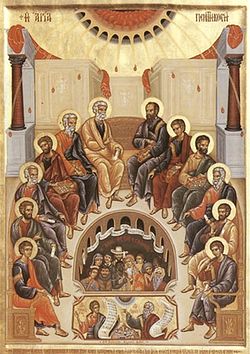 |
| The Descent of the Holy Spirit on the Apostles |
The disciples were all with one accord in one place. And suddenly there came a sound from heaven as of a rushing mighty wind, and it filled all the house where they were sitting. And there appeared unto them cloven tongues like as of fire, and it sat upon each of them. And they were all filled with the Holy Ghost, and began to speak with other tongues, as the Spirit gave them utterance (Acts 2:1–4). The people who gathered at this extraordinary noise became the witnesses and participants of this event. They were confounded. And they were all amazed and marvelled, saying one to another, Behold, are not all these which speak Galilaeans? And how hear we every man in our own tongue, wherein we were born? (Acts 1:7–8). Then, about sixteen different languages and dialects are named.
But if the Apostles had each simply spoken in some new language, then no one would have been able to hear a single word. The miracle of Pentecost consists in the fact that all language barriers just disappeared.
The Kontakion of the feast reminds us when these barriers appeared: “When the Most High came down and confused the tongues,” in order to stop the mindless construction of the tower of Babylon. Now the Lord “distributed the fiery tongues and called all to unity.” At the same time, the walls of the house where the Apostles were as if disappeared. And all the nations that came to Jerusalem for the feast suddenly turned up in that place: a heavenly voice spoke of the wonderful works of God (Acts 1:11). This voice came from the Apostles, and yet did not come from them. Therefore some heard the Apostles speaking in their dialect; others saw them as if removed from this voice, as if not in their right mind, and mocking said, These men are full of new wine (Acts 1:13).
The miracle of Pentecost showed people in an instant what they are capable of in communion with God and each other, for what they were created, for what they must strive, and what the Church is.
But only the Apostles remained in this fullness, because only they had been taught during their three years of associating with the Lord Jesus Christ. The Holy Spirit does not unite those who do not strive for unity, who are not yet verbally taught the truths of the faith, or the obligations of their relationship to each other.
The Gospel today also shows not only an image of divine unity of people, but also the first human step toward that unity. One day, in the Sanhedrin, where accusations were again being brought against Jesus, righteous Nicodemus arose and said, Doth our law judge any man, before it hear him, and know what he doeth? (Jn. 7:50).
A simple requirement of common sense: having heard the accusation, ask the accused if it is so. If you can’t ask him, or if he says, “no,” and if his guilt cannot be proven, then no one would dare to call him guilty. We would be justifiably indignant with any judge who is ready to sentence on the basis of accusation alone. But as long as we ourselves do not stop immediately believing the bad things we hear about other people, we will also be judged by the same partial, inhuman judge. For with what judgment ye judge, ye shall be judged (Mt. 7:2).
And if the Lord finds us in this rotten place and destroys the shell over our soul, then we will find ourselves in terrible confusion, because our alienation from each other, and from God Himself, will be laid bare in all clarity.
Therefore, when some one says, writes, or shows us something unkind about people we know or don’t know, about the great or small of this world; if they whisper in our ear or trumpet it to the whole world—let us remember the words of righteous Nicodemus: “Does our law judge a man before it has heard him?
If we are not capable even of this, then we will never have the higher unity in love in the Holy Spirit.
